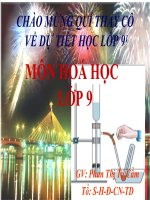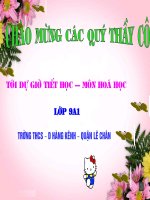Côn trùng học của Fabre
Bạn đang xem bản rút gọn của tài liệu. Xem và tải ngay bản đầy đủ của tài liệu tại đây (8.21 MB, 344 trang )
iii!liilll;f!ii!|;::|1;':^:'^:;ll';:;
^f>
FABRE'S
BOOK OF INSECTS
^^1*1
i
i
:iJ
THE SACRED BEETLE
Sometimes the Scarab seems
to
a friend
enter into partnership zvith
Poge 13
)
hahr-e
,
^''''•'
J«
I
'~ux ^
'
fi i^
FAB RE'S
?
BOOK OF INSECTS
RETOLD FROMALEXANDER TEIXEIRADE MATTOS'
TRANSLATK)N of FABRES "SOUVENIRS ENTOMOLOGIQUES"
FT MRS.RODOLPH STAWELL
Illustrated
hy
E-J-DETMOLD
NEW YORK
DODD,
MEAD AND COMPANY
1921
COPTBIOHT, 1921.
Bt DODD. itEAD AND COICPANT. INQ
PRINTRD nr
U. B. A.
CONTENTS
CHAPTER
I
MY WORK AND MY WORKSHOP
CHAPTER
THE SACRED BEETLE
CHAPTER
PAGE
i
II
u
m
THE CICADA
2$
CHAPTER
THE PRAYING MANTIS
IV
40
CHAPTER V
THE GLOW-WORM
54
CHAPTER
VI
A MASON-WASP
69
CHAPTER
THE PSYCHES
VII
89
vii
CONTENTS
CHAPTER VIII
THE SELF-DENIAL OF THE SPANISH COPRIS
CHAPTER IX
TWO STRANGE GRASSHOPPERS
PACE
.
.
109
121
CR\PTER X
COMMON WASPS
138
CHAPTER XI
THE ADVENTURES OF A GRUB
157
CHAPTER
XII
THE CRICKET
175
CHAPTER
XIII
THE SISYPHUS
198
CHAPTER XIV
THE CAPRICORN
209
CHAPTER XV
LOCUSTS
227
CHAPTER XVI
THE ANTHRAX FLY
viii
149
LIST OF ILLUSTRATIONS
THE SACRED BEETLE
.
.
Frontispiece
.
Sometimes the Scarab seems to enter into partnership with a friend
THE CICADA
^,„„,
PASB
In July, when most of the insects in my sunny country are parched with
thirst, the Cicada remains perfectly cheerful
26
THE PRAYING MANTIS
A
long time ago, in the days of ancient Greece, this insect was
Mantis, or the Prophet
named
42
PELOPiEUS SPIRIFEX
When
finished the work is amber-yellow,
outer skin of an onion
and rather reminds one of the
80
THE PSYCHES
It is a
is the secret of the walking bundle of sticks.
Caterpillar, belonging to the group known as the Psyches
This
Faggot
...
90
THE SPANISH COPRIS
The burrow
is almost filled by three or four ovoid nests, standing one
116
against the other, with the pointed end upwards
THE WHITE-FACED DECTICUS
The Greek word
is
dectikos
well named.
It is
means biting, fond of biting. The Decticus
eminently an insect given to biting
.130
.
.
.
COMMON WASPS
The
wasp's nest
formed of
is
made
of a thin, flexible material like brown paper,
particles of
wood
144
THE FIELD CRICKET
one of the humblest of creatures able to lodge himself to
He has a home; he has a peaceful retreat, the first
180
condition of comfort
Here
is
perfection.
LIST OF ILLUSTRATIONS
THE SISYPHUS
PAfll
The mother
The
harnesses herself in the place of honour, in front.
father pushes behind in the reverse position, head
downwards
.
.
204
.
.
238
ITALIAN LOCUSTS
"I have buried underground," she says, "the treasure of the future"
THE ANTHRAX FLY
Her
delicate suit of
downy
merely breathing on
tunnels
it,
velvet,
from which you
take the
bloom by
could not withstand the contact of rough
258
FABRE'S
BOOK OF INSECTS
BOOK OF INSECTS
FABRE'S
CHAPTER
I
MY WORK AND MY WORKSHOP
WE
have our own
all
Sometimes these
talents, our special gifts.
gifts
seem
to
come
from our forefathers, but more often
to us
it is
difficult to trace their origin.
A goatherd,
perhaps, amuses himself by counting little
pebbles and doing sums with them.
He
becomes an
toundingly quick reckoner, and in the end
of mathematics.
is
as-
a professor
Another boy, at an age when most of
us care only for play, leaves his schoolfellows at their
games and
listens to the
secret concert heard
music.
his
A
third
—
imaginary sounds of an organ, a
by him alone.
He
has a genius for
so small, perhaps, that he cannot eat
bread and jam without smearing his face
keen delight in fashioning clay into
amazingly
lifelike.
—takes a
little figures
If he be fortunate he will
that are
some day
be a famous sculptor.
I
To talk about oneself is hateful, I know, but perhaps
may be allowed to do so for a moment, in order to intro-
duce myself and my studies.
[1]
FABRE'S
From my
BOOK OF INSECTS
earliest childhood
the things of Nature.
It
I
have
felt
drawn towards
would be ridiculous
that this gift, this love of observing plants
my
soil
Of my
and sheep.
suppose
and
insects,
who were uneducated
and observed little but their own cows
was inherited from
people of the
to
ancestors,
four grandparents only one ever
opened a book, and even he was very uncertain about
Nor do
spelling.
I
owe anything
Without masters, without
to a scientific training.
guides, often without books, I
have gone forward with one aim always before
add a few pages
As
—
self as a tiny boy,
of
my
so
many
years back!
extremely proud of
attempts to learn the alphabet.
remember
the delight of finding
gathering
my
One day
row of
From
I
first
trees that
window
the sky, tossing before the
wind
—ever
I
my
can see my-
I
first
And
first
braces and
very well
bird's nest
I
and
At the top of
it
was a
I
could see them against
or writhing
madly
in the
wished to have a closer view of them.
was a long climb
short.
—
had long interested me very much.
home
I
my
a hill.
at
snow, and
to
:
mushroom.
was climbing
the little
me
to the history of insects.
look back
I
his
so long;
and
my
legs
It
were very
clambered up slowly and tediously, for the
grassy slope was as steep as a roof.
Suddenly, at
my
feet, a lovely bird flew
[2]
out from
its
MY WORK AND MY WORKSHOP
hiding-place under a big stone.
found the
and had
nest,
In a
which was made of hair and
by
six eggs laid side
side in
nest I ever found, the
first
birds were to bring me.
of the
I
had
fine straw,
The eggs were
it.
a magnificent azure blue, very bright.
lay
moment
This was the
many
first
joys which the
Overpowered with
pleasure, I
down on the grass and stared at it.
Meanwhile the mother-bird was
from stone
she was suffering.
of prey.
I
"Tack!
to stone, crying
the greatest anxiety.
Tack!"
was too small
I
I
flying about uneasily
made
to
in a voice of
understand what
a plan worthy of a little beast
would carry away
just one of the pretty blue
eggs as a trophy, and then, in a fortnight,
I
would come
back and take the tiny birds before they could
Fortunately, as
I
away.
walked carefully home, carrying my blue
egg on a bed of moss,
"Ah!" said
fly
he.
I
met
"A
the priest.
Saxicola's egg
I
Where did you
get it?"
I told
him the whole
others," I said,
"when
story.
the
"I shall go back for the
young
birds have got their
quill-feathers."
"Oh, but you mustn't do that I" cried the
"You mustn't
priest.
be so cruel as to rob the poor mother of
all her little birds.
Be a good boy, now, and promise not
to touch the nest."
[3]
BOOK OF INSECTS
FABRE'S
From
conversation
this
that robbing birds' nests
and beasts have names
"What
are the
Saxicola
just like ourselves.
mean?"
all
asked
I
first,
cruel and, secondly, that birds
is
names of
and meadows?"
two things:
learnt
I
Years
my
"And what does
myself.
later I
means an inhabitant of the
woods
friends in the
learnt that Saxicola
My
rocks.
bird with the
blue eggs was a Stone-chat.
Below our
the brook
was a spinney of beeches with smooth, straight
The ground was padded with
trunks, like pillars.
It
was
in this
spinney that
which looked, when
dropped on the
were
many
colours.
and beyond
village there ran a little brook,
I
nrjoss
I
my
picked
first
moss.
mushroom,
like
an egg
by some wandering hen.
There
caught sight of
it,
others there, of different sizes, forms,
Some
extinguishers,
were
some
shaped
like cups:
like
bells,
some
and
like
some were broken, and
were weeping tears of milk: some became blue when
I trod
Others, the most curious of
on them.
like pears
—
with a round hole at the top
whence a whiff of smoke escaped when
under-side with
these,
my
finger.
I
and made them smoke at
filled
my
all,
a sort of
I
my
were
chimney
prodded their
pockets with
leisure, till at last
they were reduced to a kind of tinder.
Many
a time
I
returned to that delightful spinney,
[4]
MY WORK AND MY WORKSHOP
and
my
learnt
company of
first
lessons
in
My
the Crows.
mushroom-lore in the
collections, I
need hardly
were not admitted to the house.
say,
—by observing Nature and making experi-
In this way^
ments
—nearly
all
except two, in fact.
my
I
lessons
my
all
have received from others two
lessons of a scientific character,
whole course of
have been learnt:
and two only,
in the
one in anatomy and one in
life:
chemistry.
I
owe
the
first
to the learned naturalist
who showed me how
don,
to explore the interior of a
Snail in a plate filled with water.
and
The
lesson
was short
fruitful.^
My first introduction to
It
Moquin-Tan-
ended
chemistry was less fortunate.
in the bursting of a glass vessel, with the result
that most of
my
fellow-pupils were hurt, one of them
nearly lost his sight, the lecturer's clothes were burnt to
pieces,
with
and the wall of the lecture-room was splashed
stains.
Later on, when
I
returned to that room, no
longer as a pupil but as a master, the splashes were
On
there.
Ever
after,
my pupils
It has
*
still
that occasion I learnt one thing at least.
when
I
made experiments
of that kind,
I
kept
at a distance.
always been
my great desire
to
have a laboratory
See Insect Adventures, retold for young people from the works of Henri Fabre.
[5]









